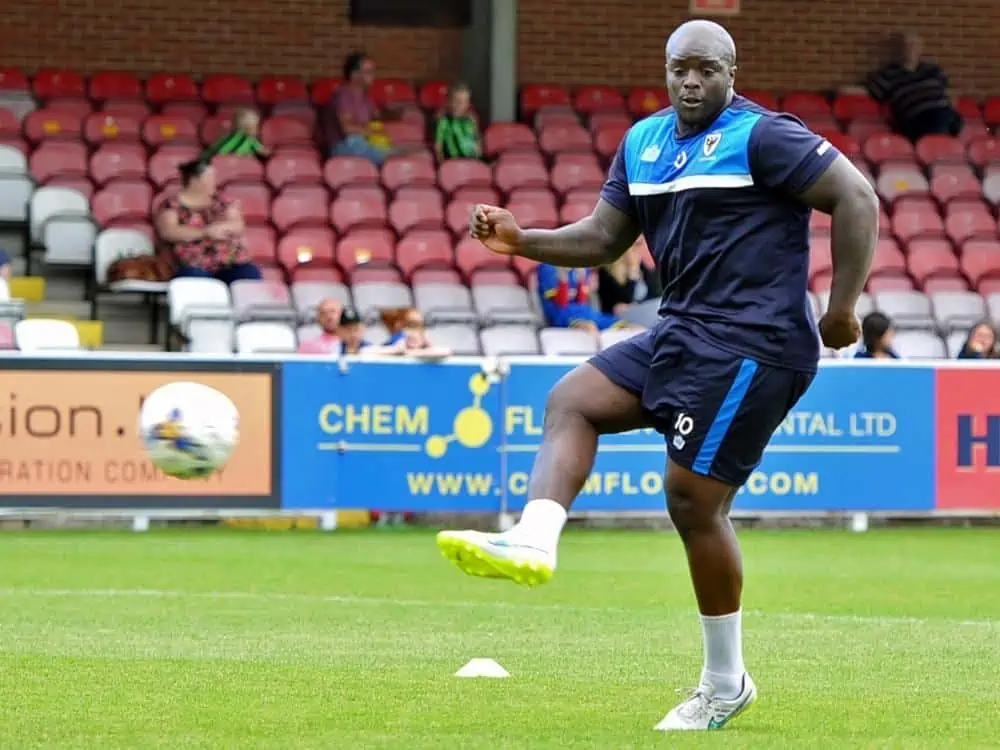Share the post "Calories Soccer Players Burn (Diet + Health Benefits)"
Soccer is one of the most physically demanding sports globally that burn the most calories. A typical soccer player burns many calories in just 1.5 hours of a soccer game.
A study shows that professional athletes spend around 3400 calories daily playing soccer.
Competitive games and vigorous training have, of course, increased the energy requirements dramatically. Both amateur and professional soccer players need to focus on performing a lot of physical activity to meet that demand.
It includes long hours of intense training and high-quality nutrition.

How Many Calories Do Soccer Players Burn During a Match?
Playing soccer, as well as other sports, is an excellent way to burn calories. A professional soccer player can easily extract about 2 to 3 liters of sweat in a single game. It’s especially true if the weather is humid and hot.
The Harvard Health Publications report that a soccer player with a weight of 155 to 185 pounds can easily burn up to 311 calories during just half an hour of playing soccer.
This rate is comparable to other professional athletes such as racquetball, ice skating, and tennis players.
Number of Calories Burnt Depends Upon Multiple Factors
It’s important to note that the rate at which soccer players burn calories depends on other factors.
Other than aerobic activity that includes jogging and walking, the total number of calories burnt during a soccer game varies depending upon the pace, the intensity of movements, and the weight of soccer players.
A typical soccer game is one and a half hours long, but tripling the rate of calories burnt in 30 minutes won’t give you accurate results.
Some substitutions occur in a soccer game, meaning that not all players play a soccer game for 90 minutes.
Other than that, players’ positions also play a critical role in the total number of calories burned. For example, a midfielder usually burns calories faster than a goalkeeper.
That’s because the position of a goalkeeper remains the same throughout the game. Midfielders burn more calories because they cover a large soccer field area.

How to Calculate the Number of Calories Burned During a Soccer Game?
The best way to measure the number of calories a soccer player burns is to use the MET value. MET stands for “Metabolic Equivalent of Task” which is soccer in this case. The metabolic equivalent value of soccer is “7”.
This value is multiplied by the person’s body weight (in kilograms) and added to the MET formula given below.
(weight of a soccer player in kilogram) x MET soccer value x (0.0175) x total minute = number of calories burned
So, if a person’s weight is 170 pounds (77.1 kilograms), then s/he will burn the following number of calories in 30 minutes.
Calorie Calculation
(77.1) x (7) x (0.0175) x (30) = 283.3 calories
So, half an hour of soccer burns 283 calories if a person weighs 170 pounds.
What Type of Diet do Soccer Players Follow?
A soccer player can’t follow a diet plan of a regular person as it usually contains too many unhealthy fats. Professional soccer players usually aim to consume a diet consisting of at least 60 percent carbohydrates.
These foods include high-fiber cereals, potatoes, wholemeal bread, pasta, and brown rice. Twenty-five percent of footballers’ total calories should be in the form of healthy fats commonly found in raw nuts, avocados, olive oil, and fish oil.
The remaining percentage consists of different foods with a lot of protein, including lean red meat, low-fat milk, poultry, and fish.

8 Health Benefits of Playing Soccer
Soccer is one of the most popular and commonly played sports worldwide. It’s a fun and active sport with various mental and physical health benefits. Here we have listed some of the most important ones.
1. Improves Aerobic Capacity
Soccer players are constantly on the move while on the field for 90 minutes. Running, especially at high intensity, requires higher stamina. The training of soccer players allows them to have incredible aerobic capacity.
They can abruptly change their pace from sprinting to walking, and it’s also easy for them to perform these actions repeatedly.
2. Improves Muscle Tone and Lowers Body Fat
Soccer simulates fast and slow twitch muscle fibers and allows players to burn fat and build muscle mass. It’s important to note that playing soccer burns a lot more calories than traditional workouts.
That’s because professional soccer players must constantly switch between anaerobic and aerobic energy pathways.
3. Regulates Cardiovascular Health
A professional soccer player runs for at least 5 miles during the match. The movements also include jogging and walking keeps the heart rate of a player up. In other words, every player performs a great cardiovascular exercise during a soccer game.
The calorie burn and continuous movement allow soccer players to resist plaque buildup in arteries and strengthen their hearts.

4. Builds Muscle Strength
Strength and energy in the lower body part are necessary for turning, twisting, tackling, jumping, and kicking. Powerful legs also allow soccer players to have explosive speed.
On the other hand, the upper body strength comes in handy for throw-ins, holding off opponents, shielding the ball, and so on. It also improves the overall energy and stamina of players.
Playing soccer regularly makes the upper and lower body parts powerful and full of energy.
5. Increases Bone Strength
According to the general rule, bone density decreases with age. Playing soccer keeps your bones stronger because of the continuous weight-bearing loads.
The strength of your overall bone structure improves, and playing football regularly is a great way to maintain your fitness throughout your lifetime.
6. Improves Cognitive Function
Not only does soccer enhance your physical health, but it also improves your concentration by regulating cognitive function. It also boosts your self-discipline and persistence as it allows you to make quick decisions on the go.
Your brain functions better and allows you to identify territorial advantages to outperform your opponent. These abilities not only help you to perform better during a match but also allow you to be more productive in your personal life.
7. Promotes Teamwork
Fitness goals are typically extremely personal, but soccer improves your mental health by promoting teamwork. The skills players learn during a soccer match and their training transfer to their personal lives.
The camaraderie shared by a soccer team is unrivaled. When it comes to everyday life, the capacity to collaborate with others to achieve a shared objective is extremely valuable, and soccer promotes that in individuals.
8. Reduced Anxiety and Depression and Increased Self-Esteem and Confidence
Endurance and physical strength boost the confidence level of soccer players. Self-esteem and confidence improve not only athletic performance but also friendships, family life, professional performance, and academic success.
Because of high-intensity exercises, the endorphins (feel-good hormones) are released into the player’s body. These hormones help a great deal with stress and anxiety.
Many studies have found that exercise is a very effective therapy for anxiety and depression.
Share the post "Calories Soccer Players Burn (Diet + Health Benefits)"
Joel is a seasoned soccer journalist and analyst with many years of experience in the field. Joel specializes in game analysis, player profiles, transfer news, and has a keen eye for the tactical nuances of the game. He played at various levels in the game and coached teams - he is happy to share his insight with you.



